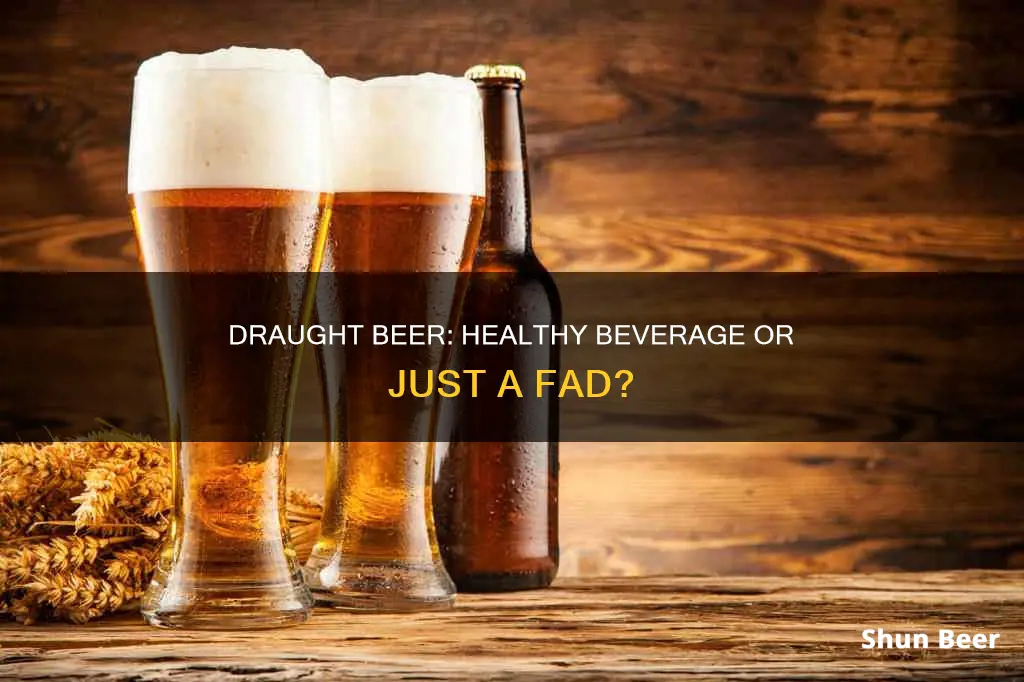
Alcohol-free draught beer is a topic of growing interest in the beverage industry, with recent studies suggesting that making these options more visible and accessible could encourage consumers to make healthier choices. The University of Bristol led a study in partnership with Bristol City Council, exploring the impact of offering alcohol-free draught beer in pubs and bars. The research revealed that when a non-alcoholic option was available, establishments sold less alcoholic beer without any negative impact on their overall revenue. This indicates that providing prominent alcohol-free draught choices may nudge people towards healthier alternatives without restricting their options. While alcohol can contribute to weight gain, addiction, and an increased risk of certain cancers and other health conditions, the availability of non-alcoholic draught beer could potentially improve public health by reducing alcohol consumption.
What You'll Learn

Alcohol-free draught beer encourages healthier choices
Alcohol-free beer has come a long way since the days of Prohibition in the US, when "near beer" was brewed to keep breweries in business. The general consensus was that these beers lacked flavour, but nowadays, alcohol-free beer (or non-alcoholic beer) is a refreshing, crisp, and light alternative to its alcoholic counterpart. Typically, these beverages have an ABV of 0.5% or lower and come in a variety of styles, including German pilsners, wheat beers, Belgian pils, and even American-style hoppy pale ales.
One of the biggest advantages of alcohol-free beer is that it encourages healthier choices. A recent study by the University of Bristol found that when pubs and bars offered alcohol-free beer on draught, they sold 29 fewer litres of alcoholic beer per week, which equates to a 5% reduction in sales. This decrease in alcoholic beer sales was replaced by an equivalent increase in sales of alcohol-free beer, clearly indicating that customers are willing to choose the healthier option when it is readily available.
The impact of alcohol on health is well-documented. It can contribute to weight gain, addiction, and has been linked to several types of cancer, including mouth, upper throat, larynx, oesophagus, breast, and bowel cancer. By providing alcohol-free beer on draught, bars and pubs can nudge their customers towards making healthier choices without restricting their options. This approach can also help reduce the negative consequences of excessive alcohol consumption, such as binge drinking and drink driving.
Heineken, one of the world's largest non-alcoholic beer brands, has recognised the importance of offering alcohol-free beer on draught. Karlijn Van Ruiten, Heineken's global innovation manager, believes that draught can be a "big unlocker" for alcohol-free beer, making it more socially acceptable and normalising the choice of non-alcoholic drinks. Heineken has developed multiple draught solutions, such as "Blade" and "David", to overcome the challenges of offering alcohol-free beer on tap, ensuring that it remains fresh and free from bacteria.
Alcohol-free draught beer is a step towards encouraging healthier choices and normalising non-alcoholic options. By increasing the visibility and accessibility of these drinks, businesses can cater to a wider range of customers and promote a healthier drinking culture.
Chelada Beers: Healthy or Harmful?
You may want to see also

Alcohol-free draught beer doesn't impact profit
Alcohol-free draught beer is becoming an increasingly popular option for consumers, with a growing market for these beverages. Heineken, for example, has made efforts to get its alcohol-free brand on taps in the UK and Europe, aiming to normalise alcohol-free beer. Research from the University of Bristol supports this strategy, finding that making alcohol-free beer more visible and accessible in bars increased sales of these beverages.
This shift towards alcohol-free beer is a positive trend for public health. Alcohol consumption is associated with weight gain, addiction, and an increased risk of several types of cancer. By offering alcohol-free options, bars and pubs can nudge their customers towards healthier choices without impacting their profits.
The study found that when an alcohol-free beer option was available on draught, pubs and bars sold 29 fewer litres of alcoholic beer per week, equivalent to a 5% reduction in sales. However, this was offset by an equivalent increase in sales of alcohol-free beer, indicating that customers were simply choosing the healthier option without reducing the venue's overall revenue.
These findings highlight the potential for alcohol-free draught beer to become a significant market segment without negatively impacting the profits of pubs and bars. While there may be challenges related to product safety and flavour, addressing these issues can unlock the potential for alcohol-free beer to become a mainstream choice for consumers.
Overall, the trend towards alcohol-free draught beer represents a positive development for both consumers and the hospitality industry, as it provides an opportunity to improve public health without compromising revenue.
Draft Beer: Healthier Choice or Marketing Myth?
You may want to see also

Alcohol is linked to weight gain, addiction and cancer
Alcohol is a known contributor to weight gain, addiction, and cancer.
Alcoholic drinks are often high in calories, and consuming more calories than your body burns can lead to weight gain. Alcohol can also affect the body's ability to absorb nutrients, such as vitamins and minerals, which are essential for maintaining a healthy weight. Additionally, alcohol can stimulate food intake and influence hormones linked to satiety, making it harder for the body to regulate energy intake and expenditure effectively.
Alcohol is also addictive, and drinking can become a serious health and social problem. Heavy drinkers may experience physical withdrawal symptoms if they suddenly stop drinking, and long-term alcohol use can lead to liver damage, increased blood pressure, and a higher risk of heart disease and stroke.
Furthermore, alcohol use is linked to an increased risk of several types of cancer, including mouth, upper throat, larynx, oesophagus, breast, and bowel cancer. Alcohol is estimated to account for about 6% of all cancers and 4% of cancer deaths in the United States. The more alcohol an individual consumes, the higher their cancer risk becomes. Even small amounts of alcohol can increase the risk of certain cancers, such as breast cancer.
Beck's Beer: Healthy Drinking or Marketing Hype?
You may want to see also

Alcohol-free draught beer is more visible and accessible
Alcohol-free beer has come a long way since the days of Prohibition-era "near beer", which was noted for its lack of flavour. These days, alcohol-free beer (also known as non-alcoholic beer) is widely available and comes in a variety of styles, including German pilsners, wheat beers, Belgian pils, and even American-style hoppy pale ales.
One of the biggest non-alcoholic beer brands in the world, Heineken 0.0, has recognised that getting alcohol-free beer on draught is vital for the growth of the category. Heineken's global innovation manager, Karlijn Van Ruiten, believes that draught could be a "big unlocker" for alcohol-free beer. When a drink is available on draught, it feels more logical to order it, and there is less social stigma attached to ordering it. This is especially true in the UK, where the volume of beer sold in the on-trade (pubs, bars, and restaurants) is mostly draught.
Research from the University of Bristol supports this idea, finding that making alcohol-free beer more visible and easier to purchase in bars led to increased sales of non-alcoholic beer. When pubs and bars replaced one draught alcoholic beer with an alcohol-free option, they sold 29 fewer litres of alcoholic beer per week, but this was replaced by an equivalent increase in sales of alcohol-free beer. This suggests that customers chose the healthier option when it was made more visible and accessible.
Alcohol-free draught beer can, therefore, play an important role in helping people make healthier choices. Alcohol can lead to weight gain, addiction, and has been linked to several types of cancer. By making alcohol-free beer more available on draught, bars and pubs can nudge their customers towards reducing their alcohol consumption and improving their health, without impacting their revenue.
Beer's Benefits: Healthy Bones, Strong Body?
You may want to see also

Alcohol-free draught beer increases consumer choice
Alcohol-free draught beer is becoming an increasingly popular option for consumers, and for good reason. Not only does it provide a healthier alternative to alcoholic beer, but it also increases consumer choice and empowers individuals to make better decisions about their alcohol consumption.
A recent study by the University of Bristol found that making alcohol-free beer more visible and accessible in bars and pubs led to a significant increase in sales of these beverages. This suggests that consumers are willing to choose healthier options when they are readily available. Furthermore, the study found that offering alcohol-free beer did not impact the revenue of drinking establishments, as the reduction in alcoholic beer sales was replaced by an equivalent increase in non-alcoholic beer sales.
Alcohol-free beer, also known as non-alcoholic beer, typically contains 0.5% ABV or less. While it may not have the same flavour profile as its alcoholic counterpart, the absence of alcohol makes it a healthier choice. Alcohol consumption has been linked to weight gain, addiction, and an increased risk of developing various types of cancer, including mouth, upper throat, larynx, oesophagus, breast, and bowel cancer. By choosing alcohol-free beer, consumers can still enjoy the taste and experience of beer without exposing themselves to these health risks.
Heineken, one of the world's largest non-alcoholic beer brands, has recognised the importance of offering alcohol-free beer on draught. Karlijn Van Ruiten, Heineken's global innovation manager, believes that draught can be a "big unlocker" for alcohol-free beer. By making it available on tap, Heineken aims to normalise alcohol-free beer and provide consumers with a more socially acceptable option. This strategy is particularly relevant in markets like the UK, where drinking culture is heavily centred around draught beer.
The availability of alcohol-free draught beer empowers consumers to make informed and healthier choices without compromising their enjoyment. It provides an alternative for those who want to moderate their alcohol intake, whether for health, personal, or other reasons. By increasing consumer choice, alcohol-free draught beer promotes a more inclusive and health-conscious drinking culture.
The Pros and Cons of IPA Beer Consumption
You may want to see also
Frequently asked questions
Alcohol-free draught beer is a healthier alternative to alcoholic beer. Alcohol can lead to weight gain, addiction, and has been linked to several types of cancer.
Draught beer, when alcoholic, can have negative health effects. Alcohol misuse increases the risk of heart disease, stroke, and liver disease.
When handled properly, draught beer is considered the freshest and most flavourful option. It is also more visible and accessible to customers, making it a popular choice.
By offering alcohol-free draught beer options, bars and pubs can nudge customers towards healthier choices without restricting their options or impacting profits.







